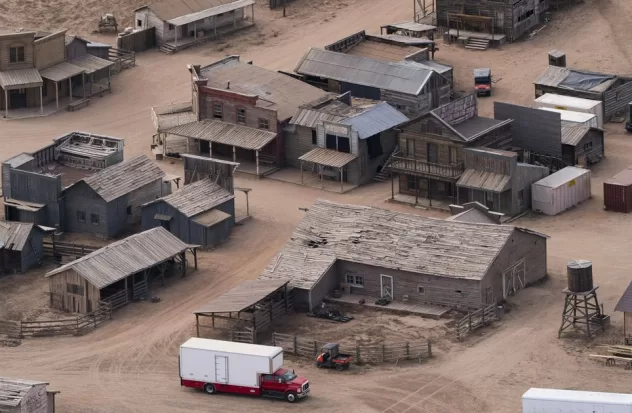New Mexico tax authorities have denied a request by Rust Movie Productions for incentives of up to $1.6 million, according to documents obtained by The Associated Press. A late July deadline is approaching for the producers to appeal the decision made earlier this month.
Meanwhile, Baldwin is scheduled to go on trial starting next week on a charge of involuntary manslaughter in the death of Halyna Hutchins. Baldwin, the lead actor and co-producer of Rust He was pointing a gun at Hutchins when it went off, killing the director of photography and wounding director Joel Souza.
Application
Melina Spadone, an attorney representing the production company, said the tax incentive would be used to fund a legal settlement between the producers and Hutchins’ widower and son.
“The denial of the tax credit has disrupted those financial arrangements,” said Spadone, a senior attorney at Pillsbury Winthrop Shaw Pittman, based in New York and Los Angeles. The attorney helped negotiate the 2022 agreement that restarted the stalled production of Rust in Montana with some of the original cast and crew, including Baldwin and Souza. Filming wrapped last year.
The terms of the deal are confidential, but producers say completing the film was intended to honor Hutchins’ artistic vision and generate money for her young son.
Court documents indicate that settlement payments will be delayed for up to a year as attorneys for Hutchins’ widower determine next steps, including whether to resume wrongful death litigation or pursue new claims. Legal representatives for Matthew Hutchins did not respond to phone and email messages seeking comment.
The Baldwin trial and the film’s application for tax incentives have financial implications for New Mexico taxpayers. The Santa Fe District Attorney’s Office says it has spent $625,000 related to the lawsuits. Rust until the end of April.
What does the incentive program consist of?
The state’s film incentive program is one of the most generous in the country, offering direct reimbursement of 25% to 40% on a range of expenses to attract film projects, employment and infrastructure investments. As a percentage of the state budget, only Georgia pays more in incentives.
It includes a unique option to assign the payment to a financial institution. This allows producers to use the refund to finance production in advance, often layering the refund rights and future film revenues into production loans.
Beneficiaries of the rebate program include the 2011 film Cowboys and Aliens and the television series Better Call Saul, derived from Breaking Bad. In terms of current productions, New Mexico is the backdrop for a new film starring Matthew McConaughey and America Ferrera about the rescue of students from a 2018 wildfire in the town of Paradise, the most destructive in California history.
Implications
Charlie Moore, a spokesman for the New Mexico Department of Taxation and Revenue, declined to comment specifically on the request. Rust, citing concerns about confidential taxpayer information. Applications are reviewed for a long list of accounting and claims requirements.
During a recent 12-month period, 56 film incentive applications were approved and 43 were partially or fully denied, Moore said.
Documents obtained by AP show that the New Mexico Film Office issued a memo in January to Rust which approved eligibility to apply for the tax incentive, in a process that involves accounting books, research into outstanding debts and a closing credit to New Mexico as a filming location. Tax officials have the final say on whether expenses are eligible.
Spadone, the lawyer of Rust, He said the denial of the request was “shocking” and could undermine confidence in the fiscal program with a chilling effect on the refund-backed loans that boost the local film industry.
Alton Walpole, production manager for Santa Fe-based Mountainair Films, who was not involved in Rust, He said he blames the film’s creators for apparently cutting corners on safety, but officials have an obligation to review their tax credit application based solely on legal and accounting principles, or risk losing important projects that could go to other states. Movies are inherently dangerous, even without firearms on the set, he noted.
“They’re going to say, ‘Wait, we’re going to New Mexico? They might deny reimbursement,'” Walpole said. “They’re watching every penny.”
“Popular opinion? I would say don’t give them the refund. But legally, I think they qualified for everything,” he said.
At least 18 states have enacted measures to implement or expand film tax incentives beginning in 2021, while some have gone in the opposite direction and sought to limit the credit that can be transferred and refunded.
Under Democratic Gov. Michelle Lujan Grisham, New Mexico raised annual spending limits and expanded the film tax credit amid a multibillion-dollar surplus tied to record oil and natural gas production. Film rebate payments totaled $100 million in the fiscal year ending June 2023 and are expected to rise to nearly $272 million by 2027, according to records from the tax agency and the Legislature’s budget and accountability office.
Democratic state Sen. George Muñoz has criticized the incentive program and questioned whether taxpayers should be responsible for unexpected expenses.
“If we’re going to do tax credits and there’s a problem on the film or on the set, do they really qualify or do they disqualify themselves?” said Muñoz, chairman of the Senate’s main budget-writing committee.
Rust It does not yet have a distributor in the United States, and producers usually buy newly completed films at film festivals.
FUENTE: AP

